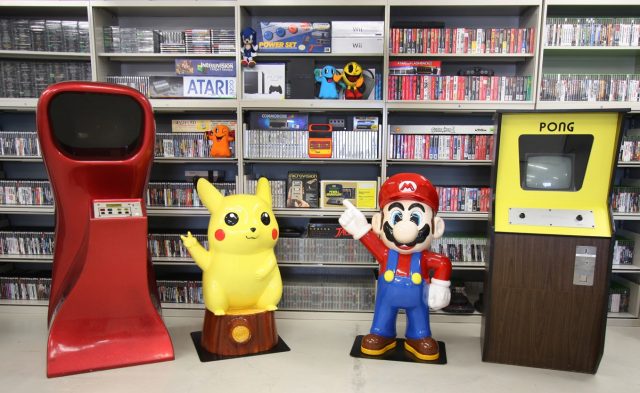Can an online library of classic video games ever be legal?


Aurich Lawson | Getty Images | Gottlieb
For years, video game curators, librarians and historians have argued for a DMCA exemption that would allow them to legally share emulated versions of their physical game collections with remote researchers via the Internet. But these preservation advocates continue to face resistance from industry trade groups, who fear an exemption would open a legal loophole for “online arcades” that could give the public free, legal and generalized to classic games protected by copyright.
This long-standing argument was echoed once again earlier this month during live-streamed testimony before the Copyright Office, which is considering new DMCA rules as part of its regular three-year process. During that testimony, representatives from the Software Preservation Network and the Library Copyright Alliance defended their proposal for an “individualized human review” system to ensure that temporary access to remote games would be granted “primarily for of private study, erudition, teaching.” , or research.”

Speaking on behalf of the Entertainment Software Association trade group, however, attorney Steve Englund said the new proposal represented “not a lot of movement” from supporters and was “incomplete at best.” . And when asked what would constitute protections “comprehensive” enough to satisfy the ESA, Englund demurred.
“I don’t think there is a combination of limitations right now that ESA members would support to provide remote access,” Englund said. “Preservation organizations want great discretion in managing valuable intellectual property. They have yet to…show willingness on their part in a way that could reassure the owners of that intellectual property.”
Obstruct research
Research institutions can currently provide remote access to digital copies of works such as books, films, and music through specific DMCA exemptions issued by the Copyright Office. However, there is no similar exemption allowing temporary digital copies of video games to be sent to interested researchers. This means that museums like the Strong Museum of Play can only provide access to their extensive gaming archives if a researcher physically visits their premises in Rochester, New York.

At the recent Copyright Office hearing, industry attorney Robert Rothstein tried to argue that this was more of a “travel issue” than a legal issue requiring further investigation. rules. But Laine Nooney, a professor at New York University, countered that the need to travel represents “a significant financial and logistical barrier to research.”
For Nooney, getting from New York to the Strong Museum in Rochester would require a five- to six-hour drive “on a good day,” they said, as well as overnight lodging for any research that will take more than a little moment. part of a day. For this reason, Nooney was only able to access the Strong collection twice during his career. For researchers who live farther away — or for graduate students and researchers who don’t have as much funding — even a single research visit to Strong may be out of reach.
“You don’t go there just to play a game for a few hours,” Nooney said. “Frankly, my colleagues in literary studies or film history have fairly routine and regular access to digitized versions of the things they study… These obstacles are real and significant and they hinder research in ways that is not fair compared to our colleagues from other disciplines.”
Limited access

At the hearing, attorney Kendra Albert said conservatives proposed the idea of human review of remote access requests to “find a compromise” between “the ESA’s concerns and the need flexibility that we have emphasized on behalf of preservation institutions.” “They compared the proposed system to that already used to grant access to libraries’ “special collections”, which are not widely available to all members of the public.
But even if preservation institutions want to provide limited access to researchers, Englund says that “in the real world, people want to preserve access so they can play games for fun.” He pointed to public comments to the Copyright Office from “individual commenters (who) are very interested in recreational gaming” as evidence that some will want to exploit this type of system.
Even if an “Ivy League” library was responsible for a proposed DMCA exemption, Englund worried that less scrupulous organizations might simply provide an online “check box” for members of the public who could easily lie about their interest in the “learned game”. If a human looked at this check-box claim, it could constitute a legal loophole for widespread access to an unlimited online arcade, Englund argued.
Will restrictions be enough?

Phil Salvador of the Video Game History Foundation said Englund’s concerns about this score were overblown. “Building a video game collection is a specialized skill that most libraries don’t have the human labor, expertise, resources, or even interest in,” he said.
Salvador estimated that the number of institutions capable of putting together a physical collection of historical games is in the “single digits.” And that’s not even counting the significant resources needed to provide remote access to these collections; Dragan Espenschied, director of Rhizome Preservation, said operating the sophisticated cloud-based emulation infrastructure needed for a few hundred users to access their art archives and game retrospectives costs their organization “thousands of dollars a month”.
Salvador also referenced last year’s VGHF study which found that 87% of games ever released are out of print, making it difficult for researchers to access large swaths of video game history without institutional aid. And the games that researchers are most interested in are less likely to have undergone modern re-releases, because they tend to be “more primitive” early games with “less popular appeal,” Salvador said.
The Copyright Office is expected to rule on the preservation community’s proposed exemption later this year. But for now, there is some frustration because the industry has not been at all receptive to the significant compromises the preservation community feels it has made on these potential concerns.
“None of this will ever be enough to reassure these rights holders that this will not cause harm,” Albert said during the hearing. “If we’re talking about practical realities, I really want to emphasize the fact that proponents have continually proposed compromises that allow preservation institutions to provide the kind of access needed for researchers. It’s not clear to me that this will never be enough.” “.
News Source : arstechnica.com
Gn tech


